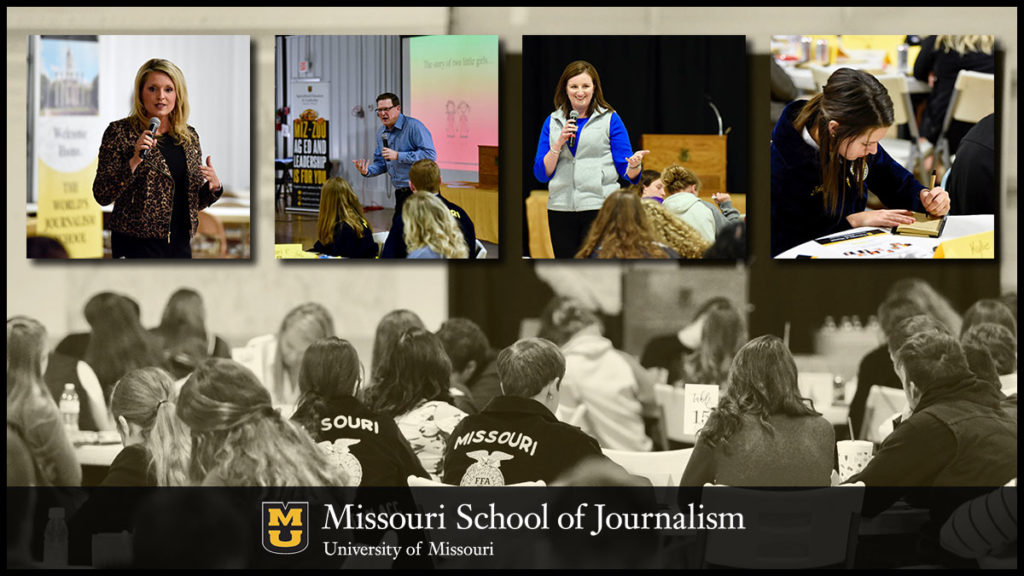High school students learn how to tell their stories about science and agriculture

More than 250 students from Missouri high schools attended an MU-sponsored career awareness day entitled “Communicating News about Science and Agriculture” held Nov. 15 at the Litton Agri-Science Learning Center in Chillicothe.
Career awareness day brings in 250 students, teachers from 24 schools from across the state; event co-hosted by the J-School.
By Jennifer Nelson
Columbia, Mo. (Nov. 19, 2019) — The benefits of scientific research and agricultural advancements touch the lives of people around the world in numerous ways, from adapting to the effects of climate change and addressing food security to fostering continued economic growth on a global scale.
These stories need to be told so people can make informed decisions, expert storytellers told the more-than-250 high school students and teachers attending the “Communicating News about Science and Agriculture” event at the Litton Agri-Science Learning Center in Chillicothe, Missouri. The Nov. 15 conference was co-hosted by the Missouri School of Journalism and MU College of Agriculture, Food and Natural Resources.
The career awareness day highlighted the importance of factual and unbiased storytelling and equipped students with tips and techniques to tell their own stories, particularly when it comes to the topics of agriculture and science. Students from 24 schools from across the state of Missouri attended the event.
Storytelling skills are useful for everyone, regardless of one’s occupation, the presenters said. Being able to connect with others helps them better understand how they’re personally affected by the issues.
“There are so many issues that face farmers and ranchers today that aren’t always told,” said keynote luncheon speaker Tyne Morgan, who serves as executive producer of U.S. Farm Report. “It is so vital that we hit on all of these issues from rural broadband and health insurance to the trade war.”
The day’s presenters and their topics were:
- Storytelling 101. Andrew McCrea, national public speaker and broadcaster.
- How do you know what to believe? Ruby Bailey, executive editor, Columbia Missourian.
- Developing compelling narratives for radio. Kristofor Husted and Rebecca Smith, reporters, KBIA-FM, an NPR-member station.
- The power of visuals in storytelling. Lynden Steele, director, Pictures of the Year International.
- Why it’s important to tell your story. Chris Chinn, director, Missouri Department of Agriculture.
- Living the dream job. Christine Tew, director of communications, Missouri Soybean Association and the Missouri Soybean Merchandising Council.
Opportunities like this event allow those throughout the state to engage with and access experts and other resources at MU, said J-School Professor Suzette Heiman, who organized the event.
“Helping young people learn how to tell their stories is one way we can help prepare them for their careers and better serve Missourians,” said Heiman. “They have incredible and exciting stories to share, which will help others seek credible sources and make decisions based on facts.”
Students who attended the event expressed interest in about 90 different career options, including accounting, agribusiness, agricultural communication, computer science, filmmaking, graphic design, journalism, photography, strategic communication and veterinary medicine.
Senior Rachel Klein of Silex High School came with her ag communications class. She plans to major in animal science at MU and eventually go to vet school. She says she felt the event was useful because it shared the importance of storytelling and communication in any career.
“Being a vet involves a lot of communication with your clients,” she said. “I think being able to relay the message and being clear in what you’re talking about is very important.”
Event organizers asked students to share a key takeaway from the event. Here are a few they shared:
- “If you find something you love, you won’t work a day in your life.”
- “What we do has major value. We are the leaders of the world.”
- “Start with what you know and learn as you go.”
- “No one can tell your story but you.”
- “Check your facts before believing something.”
- “Stories influence people no matter how they are told.”
- “Don’t forget to ask ‘So what?’ and ‘Now what’?”
- “The most valuable stories out there are the ones not being told.”
- “We have to share our stories to educate those who don’t know.”
- “Stories educate people so they can make informed decisions.”
- “It’s OK not to know everything but tell people what you do know.”
Updated: November 10, 2020